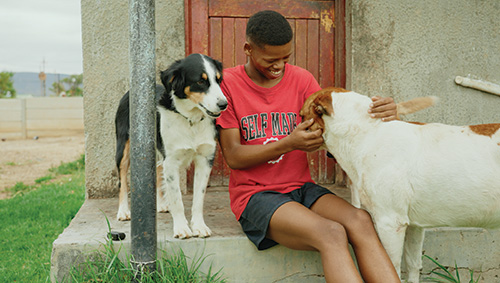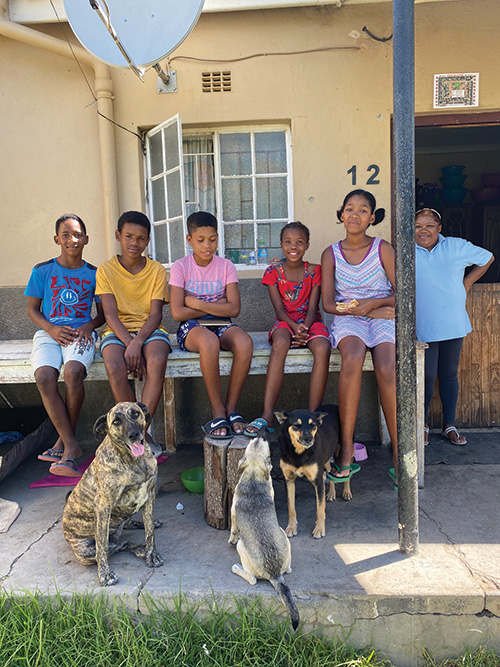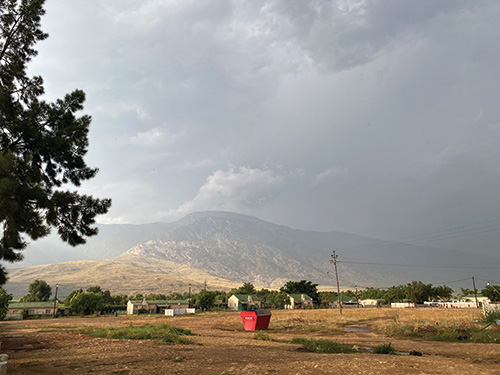


Documentary: Maak stil die geblaf
Maak stil die geblaf, directed by Marisa van Tonder, follows a group of eleven-year-old kids and their dogs. As these children from a farming community in De Doorns train Tiger, Fluffy, Sussa and Lady to jump hurdles and crawl through tunnels, they learn important life lessons. They learn compassion towards animals as they discover their own voices and navigate a path into their own future.
Marisa, who also produced the documentary, says that she started working with two projects that teach compassion towards animals in 2019 – Sidewalk Specials and The Underdog project. Marletha Hanekom from Worcester subsequently took over the classes.
Marisa’s involvement with the project was interrupted by the pandemic in 2020 and the arrival of a new baby. Until her dad told her of some film competition and encouraged her to enter. Of course, he was referring to the Silwerskerm Festival.
“It was a message from the universe that I should move out of my comfort zone.” And that is how Maak stil die geblaf was entered in the documentary category of this year’s Silwerskerm Festival.
In her creative space, Marisa focuses on projects that can help make a difference in the world. However, she was not expecting the overwhelming enthusiasm of the children she and her husband Jacques, the cinematographer, encountered on Mon Repos farm.
Marisa answered a few questions about the project.
What motivated you to embark on this project?
I love animals dearly – they are my number one! With documentaries, there is a notion that bad news should be at the core of the film’s message. But I can’t report on cruelty. It’s too upsetting. Besides, a movie should also be a vehicle to portray the good side of humanity.
I didn’t plan to shoot the dog training classes at first, but the kids were just so wonderful. And the enthusiasm! They really took ownership of the cause.
Children feel a sense of accomplishment when they teach dogs something. They learn patience and when they work with dogs, something happens that changes them – something that remains with them for the rest of their lives.
With a project like this, children also discover their own voices, and they learn how to use it. They possess the power to make a difference.
Was it easy to gain access to the kids and their dogs? Did you need to spend time with them to establish trust?
We started with the dog training classes in De Doorns in 2019. The principal of the primary school immediately made an announcement to invite interested kids who have dogs to his office.
One of the youngsters was Calvin Moses (then 12), who joined the classes with Tiger. Tiger was not his own dog; he ‘borrowed’ him from a neighbour!
When we returned to them at the end of last year, the kids were rather shy. The formality between teacher and pupil caused some strain in the beginning. But the presence of Tiger, a real busybody, dirty, covered with ticks, the one calling the shots on the farm … made all huge difference.
What the kids didn’t know at the time, was that Tiger already received training in the past to sit and to lie down. When they realised that he could obey orders, it was as if a magic spell was cast. From that moment everybody bought whole-heartedly into the process.
What stood out as a highlight or surprise of this special project?
I was surprised by how easily everything just fell into place.
What message would you like to convey to viewers?
Compassion holds immense power. There are many challenges, but also many solutions. Like intervening in a situation to foster love and clemency in children before they reach the age where cruelty raises its ugly head.
Exposure to violence triggers the fight or flight stress response in the brain. The Waves for Change organisation in Muizenberg utilises surfing to combat this, and the moment you enter the water, those two instincts are neutralised. When you touch an animal, it elicits the same reaction.
What are your hopes for the future of the kids in De Doorns?
I hope they will become leaders in their respective age groups. Calvin, who is older than the rest, is a sterling example. He is now too old to be part of the group, but he makes an excellent contribution as a volunteer.
Wat is the best advice you have received while making the documentary?
My mentor, Nadine Cloete, constantly reminded be to be more relaxed. She wanted us to show the children in their natural environment, doing ordinary things like walking and playing, instead of a high-speed focus on single moments.
What was the community’s response while you were busy with the production?
The parents were remarkable. With the classes and the filming happening simultaneously, they were grateful for a safe environment for their kids. Approximately 90% of the parents attended the competition in Stellenbosch, and they were immensely proud of their children.
Your greatest wish?
There is a much bigger story behind this one. I would love to make a full-length feature on that story one day.
